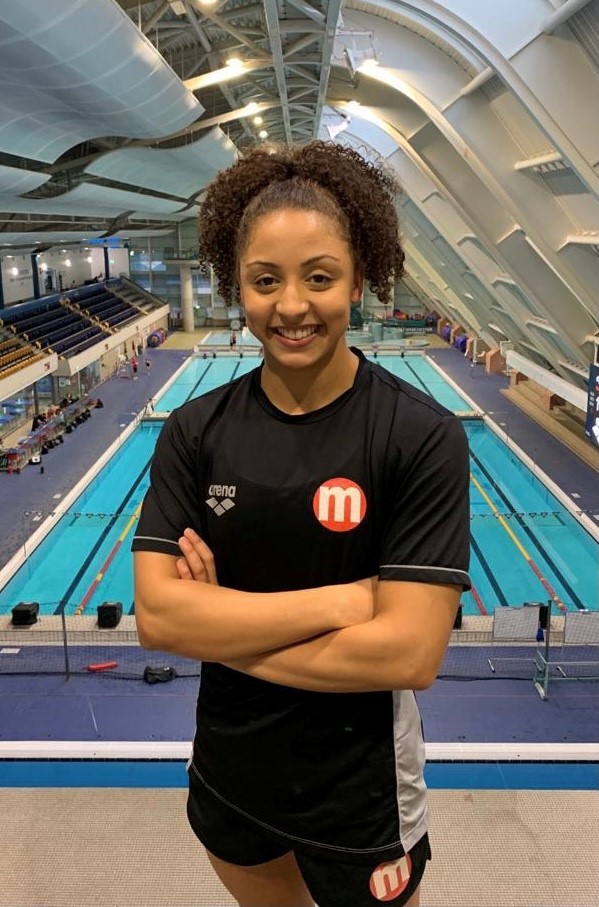Jessica's Story: Studying BSc Sports Science and MSc Strength and Conditioning at Salford
Find out more about Jessica, who studied both her undergraduate and postgraduate degrees with us, and now works as a strength and conditioning coach at Cheadle Hulme School and for Manchester City Women's FB U14 and U16s.
What courses have you studied at Salford?
I studied BSc Sports Science with Strength and Conditioning during the period 2016-2019 and I then went on to also complete my MSc Strength and Conditioning during the period 2019-2020. Both graduating with the highest class.
What did you enjoy most about studying at Salford?
During my time at Salford, one of the stand out elements was the blended practical and theory based learning techniques. The combination of hands on “real life” application whilst at the same time learning the “why’s” to the “how’s” in a sports science setting helped me to gain a deeper understanding and love for sports science and strength and conditioning.
What is your current role and what does it entail?
Currently I am a strength and conditioning coach at Cheadle Hulme School, where I lead the elites sports and high performance programmes. Here I put into practice a lot of the knowledge learnt from the University of Salford, whereby I not only programme and deliver their strength and conditioning programmes but I also work closely with a lot of external organisations to help build the best network to support our athletes at the school. This includes collaborating ideas with organisations, some of which include: Manchester Thunder Netball, Sale Sharks Rugby and Physio Fit to ensure our athletes are not over trained and are physically and mentally performing at the best level they can.
I am also the lead strength and conditioning coach and sports scientist at Manchester City Womens FC U14 and U16s where I use a multitude of skills learnt from the University of Salford. At Manchester City Womens FC U14 and U16s, on a daily basis, I collect data using a GPS device to help inform training priorities across the whole programme whilst alongside this writing and delivering their strength and conditioning work to further develop all athletes.
How did the course help you to progress into your current role?
Both the Bsc and Msc courses I did at Salford, allowed me to learn deeply about the industry via its in-depth applied modules. Alongside this, the compulsory internship programme during my final undergrad year meant I could apply my course into a real life setting whilst still learning. This exposure allowed me to gain a fully funded MSc from Sale Sharks RFU, which was great for my development across every aspect, and meant I had a head start compared to others once graduating.
Tell us a bit about yourself...

As a female of an underrepresented background (mixed black
Caribbean and white, and short in height) I have had to overcome
a number of barriers working in the field of strength and conditioning.
As the role is made up of predominantly males, females tend to
shy away from this area of work as they are naturally shorter than males,
have quieter voices and though not always, are typically weaker
in strength (due to hormones etc.). With this stigma, most females
don’t feel confident enough to lead and control a group of loud,
strong and sometimes boisterous individuals. Therefore, whilst I may
face more barriers than males, my personal philosophy to work
is to show females can certainly pursue a career in Strength
and Conditioning/Sports Biomechanics, and the UoS has helped
me to build this confidence.
What was it that made you want to pursue this particular career pathway?
Quite honestly, I was inspired by a number of the university lecturers at the UoS to be like them and do what they do. With the University of Salford having one of the best sports science degree programmes in the country I also felt like I should make the most of the opportunity and thrive from it. Also, as a full time athlete myself (swimmer), learning about the science behind “what I do” meant I had a closer relatedness to the degree and topic as a whole, which helped me to identify that "this is something I wanted to do for the rest of my life".
What are your plans for the future?
Currently I am a sports science/strength and conditioning practitioner, but in the future I aspire achieve a PhD, become a well known researcher in the industry and become a university lecturer.
What would you say to someone thinking about studying this course at Salford?
I couldn’t recommend this Msc enough and I would highly encourage students to fully immerse themselves with the programme and take as many opportunities as possible to allow them to achieve the best experience. I would also recommend taking the next step and to publish some of the MSc work you have completed. As this can open even more doors for students in the world of sports science.
Do you have any tips for someone looking to pursue a similar career to yourself?
To kick start your career, I would highly recommend beginning to build a network with neighbouring teams/clubs/organisations early on. This will really help to build a solid CV and increase the chance of employment post graduation. This might include simply shadowing, offering to test athletes on a voluntary basis or completing an internship. Do as much as you can, to be better than the rest!
